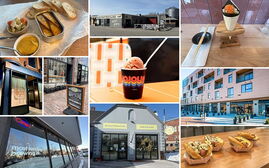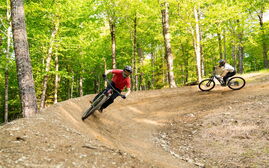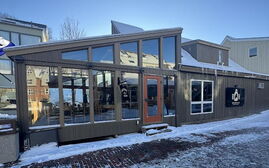For winter recreation industry — now more than ever — ‘climate change is top of mind’
 COURTESY / SUGARLOAF
In Carrabassett Valley, Sugarloaf, Maine’s biggest ski resort, has robust snowmaking capacity allowing it to keep up with climate change.
COURTESY / SUGARLOAF
In Carrabassett Valley, Sugarloaf, Maine’s biggest ski resort, has robust snowmaking capacity allowing it to keep up with climate change.
Warmer weather, unpredictable snowpack and devastating storms and floods are threatening Maine’s winter recreation industry.
The $68 million snow sector is at risk — including skiing, snowboarding, snowmobiling and other activities such as ice skating and ice fishing.
Even sled-dog racing. On Sunday, lack of snow and predicted warm temperatures forced officials to cancel this year's Can-Am Crown races, scheduled for March 1-5 in Fort Kent. The competition, including a 250-mile international race, has been drawing mushers and crowds annually since 1993.
Maine's winter recreation industry is looking to avoid outcomes like that, and to create a sustainable future.
“My hope is that, as we face climate change, our businesses understand that we can work through this,” said a veteran of the industry, Andy Shepard. “It will require leaning into his concept of resilience.”
Shepard is the founder and former director of the Maine Winter Sport Center in Caribou, a retired general manager of Saddleback Mountain and a 2011 Mainebiz nonprofit business leader of the year honoree.
He was part of last week’s ClimateWork Maine panel discussion, “On Thin Ice," which looked at the economic impact of climate change and how businesses with wintertime interests are responding.
ClimateWork Maine is an organization dedicated to helping businesses better understand the effects of climate change, plan for the future and be part of the solution.
According to Maine’s Climate Future 2020, “winter is Maine’s fastest changing season, and this has a clear impact on Maine’s important winter recreation season and associated economic benefits. Controlling greenhouse gas emissions today determines the extent to which people can still be skiing in Maine tomorrow.”
Climate Future 2020 is a report by the University of Maine’s Climate Change Institute.
Losing snow pack
Winter is the fastest-warming season in the Northeast since 1970, said Elizabeth Burakowski, a research assistant professor with the Earth Systems Research Center & Institute for the Study of Earth, Oceans and Space at the University of New Hampshire.
New England is in the hotspot of winter warming in the Northeast.
The region has fewer days that are below freezing and fewer extremely cold days of less than zero degrees Fahrenheit. New England is losing snow pack, seeing shorter winters and experiencing cold more intermittently as freeze-thaw cycles become more common and disrupt natural snow preservation.
At this time of year, some areas of Maine are used to having 2 feet of snow on the ground, but that's not the case this winter.
2022 numbers
- Overall, outdoor recreation contributed $3.3 billion to Maine economy in 2022 — nearly 4% of the gross domestic product.
- Outdoor recreation made up 3.9% of Maine’s economy, making Maine the sixth state in the country in the value outdoor recreation adds to a state’s economy.
- 32,000 people work in the outdoor industry in Maine, including 2,184 added jobs in 2022, representing a 7% increase from 2021
- Manufacturing of outdoor recreation gear and equipment contributed $271 million and retail contributed nearly $850 million to Maine’s economy
- The two largest contributors to Maine’s GDP in 2022 were boating and fishing ($412 million) and RVing ($326 million).
- Snow activities — including skiing, snowboarding, and snowmobiling — contributed $68 million, a 35% increase over 2021.
Change and adapt
Climate change particularly affects small businesses that depend on consistent accessibility and use of forests, rivers and lakes, mountains, trails, and the hunting, fishing, skiing, snowmobiling and other recreational activities connected to the state’s natural resources.
As part of a 10-year planning process, called the Maine Outdoor Recreation Economy Roadmap, climate sustainability and climate resilience have emerged as central considerations, said Carolann Ouellette, director of the Department of Economic & Community Development’s Office of Outdoor Recreation.
Businesses are adopting clean tech and have an interest in ensuring that the products and services they offer are sustainable, she said. The larger industry is seeing initiatives such as the introduction of the first electric snowmobile and more use of electric ice augurs. Skiers are expressing interest in energy-efficient snowmaking technology.
Jenny Kordick, executive director of Maine Outdoor Brands and a 2023 Mainebiz 40 Under 40 honoree, said the trade association is looking at what the industry can do in order to thrive into the future.
“Climate change is top of mind for us,” Kordick said. “Our industry is dependent on people getting outside.”
She continued, “It’s important to understand what the future will look like so we can plan proactively.”
Knowledge and preparation will help businesses have a competitive advantage going forward.
A number of the association’s members are looking at their carbon footprint, through things such as their energy, use, vehicles and supply chain.
The industry will have to change and adapt, she continued.
Energy-efficient snowmaking, for example, is an important move in the ski resort industry, which is also looking at diversifying their product mix and investing in off- season activities such as mountain biking and hiking.
“Sugarloaf has done a lot to bring trail-racing and mountain-biking events there,” Kordick noted. “We have to think about how we’ll innovate in the future to be successful in the face of climate change.”
Maine’s advantage
The association is also thinking about how to market and communicate to consumers about changes in winter sports. That includes things like safe considerations related to unpredictable weather and ice conditions.
“For people to go out, they need to be knowledgeable about conditions,” Kordick said.
While winters are getting shorter in Maine, they are everywhere else as well. Maine’s northerly geography will likely prove a competitive advantage for consumers looking for winter activities, she said.
“Maine is probably poised to be the most resilient compared with other New England states,” agreed Burkawoski.
Shay Bellas, founder and CEO of online tour and experience booking service NaviTour, said guides have first hand observations of the effects of climate change, such as shifting wildlife migration patterns and longer tick seasons.
“Their work contributes to our understanding of climate change,” Bellas said.
Moving forward, it will be critical to inform business decisions with climate science, she said.
“The pathway will be collaboration across all sectors and communities, to leverage resources and expertise,” Bellas said.
Shepard predicted that Maine will continue to have skiing while it might be difficult for ski areas in the mid-Atlantic and southern New England to continue to operate, because temperature increases will mean not only less snow but not enough cold days to be able to make snow.
In Maine, he continued, robust snowmaking capacity will be key for alpine skiing, although unlikely to support snowmobiling. Increasing temperatures will reduce the depth of pond and lake ice, resulting in a shorter ice-skating and ice fishing seasons.
“For the last 20 years or so, snowmaking in Maine has been the cost of doing business,” said Shepard. “If you have that, you’re ensured of a good, long season. If not, you’re at the mercy of Mother Nature. I think that’s become even more existential now.”














0 Comments